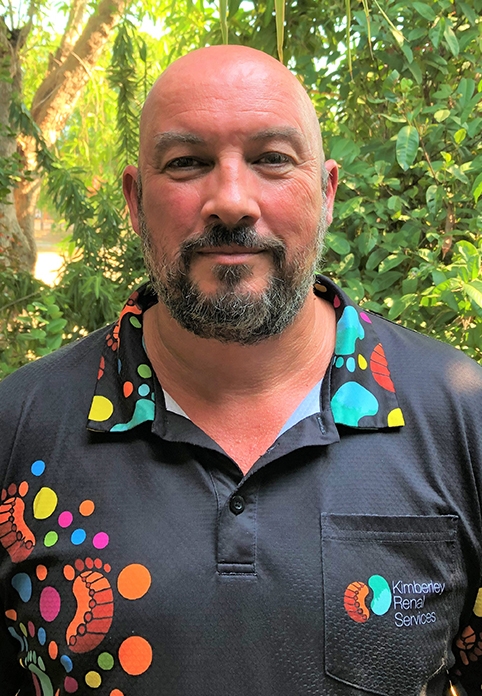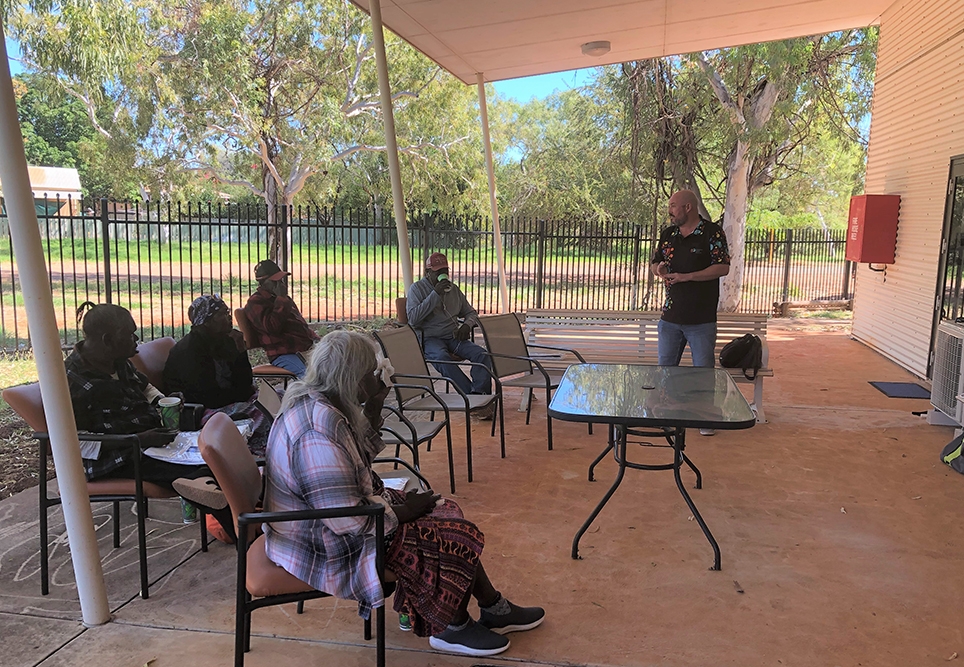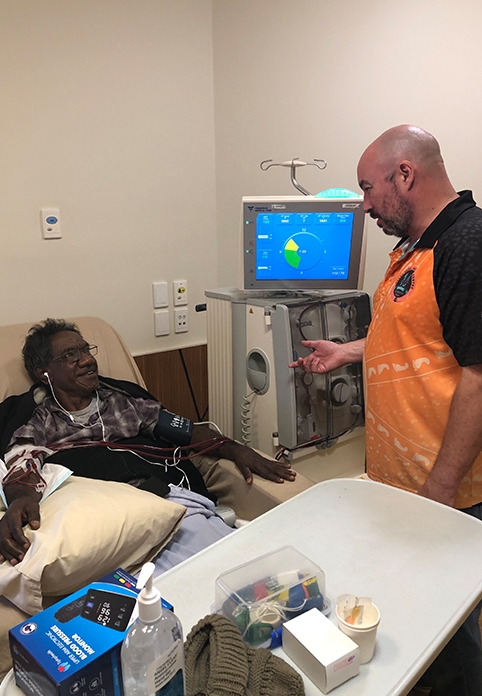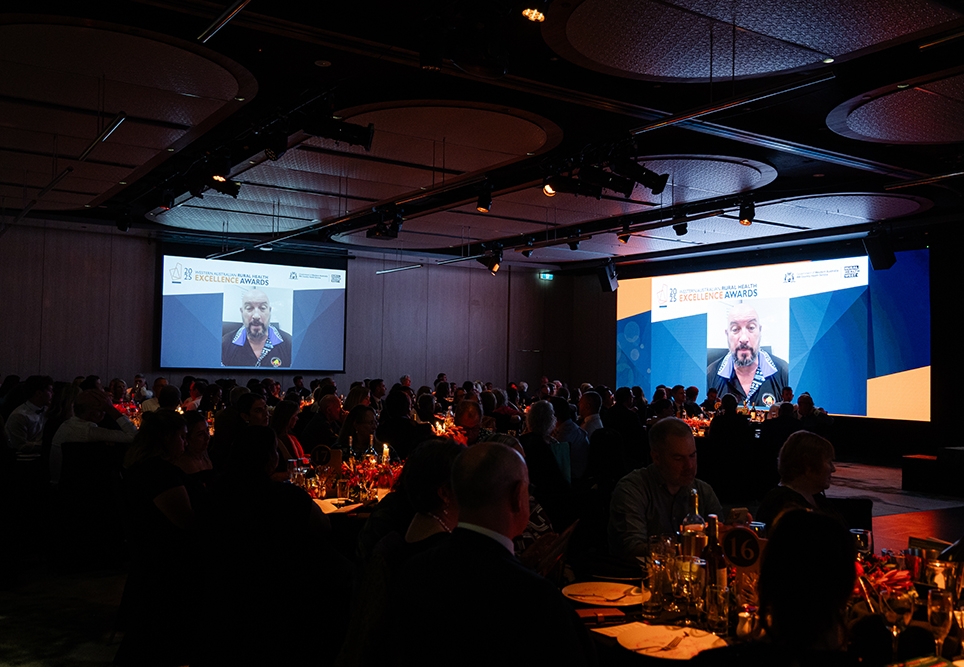This site may not work properly using older versions of Edge and Internet Explorer. You should upgrade your browser to the latest Chrome, Firefox, Edge, Safari, or any other modern browser of your choice. Click here for more information.
Your Stories
This is where we tell your stories, cover topical issues and promote meaningful initiatives.
Nurse/Midwife of the Year, Nick Corsair, transforming renal care in the Kimberley
Renal nurse, Nick Corsair, has been named Nurse/Midwife of the Year at the 2025 Western Australian Rural Health Excellence Awards – proudly sponsored by CRANAplus. Under his leadership, kidney transplants in the Kimberley region have surged, rising from just one in the previous seven years to 22. Nick shares how he and his team made it happen.
Originally from the north of England, Nick has spent more than 20 years in nursing – a journey that brought him to the other side of the world. What began as a six-month stint in Broome turned into a 15-year commitment, and counting.
The last five years have seen Nick working for Kimberley Renal Services, a wholly-owned subsidiary of Kimberley Aboriginal Medical Services, in a transplant coordination role that has now earned him this recognition as Nurse/Midwife of the Year.
“You don’t get into health care for awards, but it’s pretty special when it happens,” Nick says.
“There’s a huge team that I’m part of which is required to get any patients over the line for transplant, so to be recognised for my part within that team is great — it’s definitely a team win.”
In Nick’s role, he’s seen the challenges faced when it comes to kidney disease.
“Aboriginal people are overrepresented within kidney disease, and then very much so within dialysis,” he explains.
“When they do eventually end up on dialysis, that could be thousands of kilometres away from home.
“It’s a really insidious disease. It really just creeps up on people and affects their whole life. It takes them away from family, takes them away from community and jobs, children, everything.”
Receiving a transplant can be a ticket back to community and some sense of normality, but many barriers have made this process more complicated.
“Going back a few years, we really weren’t doing any transplants in the Kimberley,” Nick explains.
“There are several barriers that we faced with that. One of them was we were not identifying patients as suitable transplant candidates early enough … and then other things like the education program we had wasn’t great for our patients.”
“On top of all of this, you’ve got our Aboriginal patients that are engaged in this system that isn’t really designed for them.”
In 2020, Nick began working as transplant coordinator for the Kimberley Renal Services, and the team started reviewing their processes to find ways to break down those barriers and improve outcomes for the community.
“We started getting patients seen within the first three months of starting dialysis, or even in the pre-dialysis period, so that we could identify them as good candidates, or if they had barriers, we could push in the right direction to address those,” he says.
“One of our main barriers is smoking, so we try and get people engaged with local services to help them stop.
“We also brought coordination back to the Kimberley, so we’re able to reach out to local stakeholders and have good relationships with them where they understand their part in the process for our patients.
“Our patients tend to have several co-morbidities as well, so seeing specialist services is another barrier. Rurally, we get really good specialist services coming up, but we just don’t get them that frequently. Some of our patients are hundreds of kilometers away and we’ve got to get them into a local centre, so we try to address that by grouping appointments.”
All of these things have come together to see a great improvement, both in patients being identified for kidney transplants and then in being supported afterwards.
“When patients come back, we want those kidneys to last a long time, and it really does matter how they’re supported back within the local community.”
Patients who have received transplants now return to help educate others going through the same process, something Nick says is creating real hope and motivation.
“I can go and do an education session and talk for hours, but there are guys that have actually been through and had the transplant from that local area, so that really resonates with the patients.”
“It’s not an easy process, so to have somebody sat next to them that might have been dialysed six months ago really gives them hope that they can do it as well.”
After seeing the life-changing impact of transplantation, Nick hopes he can encourage more people to get checked.
“For people out there who haven’t been tested for chronic kidney disease, it’s just worth engaging and making sure that you haven’t got any issues, because it is a silent disease, especially for our Aboriginal patients.”
Do you know a remote area nurse, midwife or health professional who deserves recognition for their positive impact on remote health? Show them some love by nominating them for an Australian Remote Health Award. For everything you need to know, visit crana.org.au/awards



